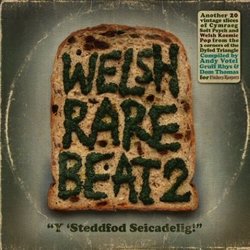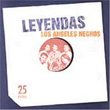| All Artists: Various Artists Title: Welsh Rare Beat 2 Members Wishing: 2 Total Copies: 0 Label: Finders Keepers UK Release Date: 1/8/2008 Album Type: Import Genres: International Music, Pop, Rock, Classic Rock Styles: Europe, Britain & Ireland, Progressive, Progressive Rock, Psychedelic Rock Number of Discs: 1 SwapaCD Credits: 1 UPC: 5060099500701 |
Search - Various Artists :: Welsh Rare Beat 2
 | Various Artists Welsh Rare Beat 2 Genres: International Music, Pop, Rock, Classic Rock
Second installment in the Welsh Rare Beat series compiled by Gruff Rhys (Super Furry Animals), Andy Votel, Dom Thomas and the Finders Keepers team. Here for your enjoyment are songs mostly about the sky, flying, seagulls, ... more » |
Larger Image |
CD DetailsSynopsis
Album Description Second installment in the Welsh Rare Beat series compiled by Gruff Rhys (Super Furry Animals), Andy Votel, Dom Thomas and the Finders Keepers team. Here for your enjoyment are songs mostly about the sky, flying, seagulls, clouds and ghosts. But also songs that deal in political activism, The Mabinogi, or issues of Welsh identity. Girl group boy meets girl songs, parodies of boy meets girls songs, Welsh language covers of English and American hits of the day sung in a traditional Welsh style counteracted by traditional Welsh Folk songs played in contemporary Anglo-American styles. Finders Keepers. 2007. Similar CDs
|
CD ReviewsWest Coast freaks, beats & folk-- from far-out Welsh beaches John L Murphy | Los Angeles | 04/09/2008 (4 out of 5 stars) "The sounds of an endless summer, circa 1969, sung in Welsh. This combination, of often West Coast California and British Psychedelia blends with girl-group pop and earnest folk to provide a soundtrack for an alternative, pre-Rave, Cymric countercultural Eisteffod. Cleverly, the album begins with a snippet from a record with a reporter gamely investigating that actual festival, before it goes into a mishmash of the Sain label's offerings concentrating on Dyfed, the south-western coastline, and its contributions to music on what had been nearly impossible to find vinyl, often singles and one-offs amidst album tracks on this pioneering Welsh-language label.
The first Welsh Rare Beat (reviewed by me on Amazon US) brought this disparate array of strange-yet-familiar sounds to the attention of audiences, and the follow-up is also curated in part by Super Furry Animal leader Gruff Rhys. He contributes liner notes in a slightly fractured English as well as Welsh, and these, along with the period-sleeve art inside, heighten the curio's charm. Heather Jones' mellifluous voice remains a highlight here as on the first compilation. She also sings as part of Bara Menyn with the equally talented Geraint Jarman and Meic Stephens, and it's a pity no full-length LP emerged-- they deserve their own release in this series, do you hear me Gruff, Andy Votel, and Dom Thomas at Finders Keepers? The other tracks from "The Dyfed Triangle" for the most part give you the novel sensation of hearing Anglo-American musical styles appropriated by singers and players eager to stamp the vocals and sensibilities of a very ancient yet very contemporary style of Welsh-language pride, relevance, and tradition onto the song formats they heard on the radio. While if you'd remove the lyrics many of the songs here might pass without much added comment on London radio at the time, the whole point is the use of Welsh to replace that of the expected English. This sort of resistance, within the structures of pop music but also challenging the media's prejudices and audience's sterotypes, can become the most subversive, cloaking a shadowy hint of radical opposition within familiar guises of pop tunes and groovy textures. As Dr Sarah Hill's recent book "Blerwytirhwng?' The Place of Welsh Popular Music" (reviewed by me on Amazon US) analyzes, many of the artists featured on both compilations also took on the revived 1960s activism of a land where for too long the people had been used to singing in Welsh only in chapel. Now, as this record preserves and reminds us, Welsh could be as pliable and enjoyable a means of celebration and contention as any other language. Listen and no matter your linguistic facility with this Celtic tongue, you can hear its power." |

 Track Listings (22) - Disc #1
Track Listings (22) - Disc #1

